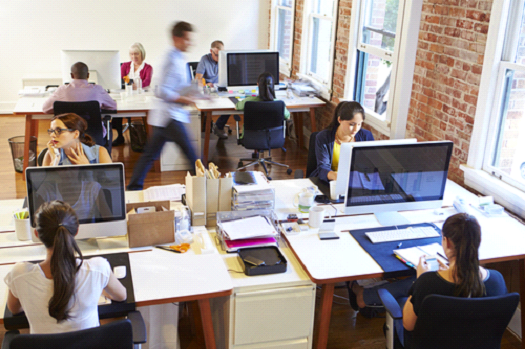It’s always a good idea to look for easy ways to reduce waste around the office. Whether it be wasted electricity or wasted water, cutting back on unnecessary consumption can help reduce your business overheads while being good for the environment overall. Here are some tips that can help make your office space less wasteful.
1 – Leverage natural light
Organizing your office around windows and other sources of natural light can go a long way toward reducing your reliance on artificial lighting. Try to match the work areas that need more light with the spots around the office where natural light is more readily available.
It’s also good to choose bright and reflective colors for the office walls. Those will do a better job of dissipating natural light throughout the office, further reducing the need for artificial lighting.
Keep in mind that natural light isn’t just a good way to reduce electricity use. Plenty of studies have pointed out that more natural light can help reduce stress levels and fatigue as well, as well as have an impact on people’s sleep patterns and circadian rhythms.
2 – Recycle more
Trash too often ends up in landfills or the ocean. Or they go to landfills, then spill over into the ocean after a few years. And as this article on ocean literacy explains, this kind of pollution poses a huge danger to marine life around the world, as well as having an impact on the environment at large.
Your office can do its part to mitigate that problem by making sure to recycle as much as possible. Every piece of plastic, paper, and cardboard recycled is one fewer piece of trash, causing problems somewhere else in the world. Electronic components and metal parts can also be recycled.
Suggested Post: ways of conserving physical features
3 – Reduce water waste
If you haven’t already, hire a plumber to audit your water usage and recommend ways to make your systems more efficient. Everything from plugging water leaks to installing water-efficient faucets can have a huge impact on your office’s overall water consumption. And given that even a small office can consume much more water than a typical household making these changes is worth the effort.
4 – Upgrade old hardware
Replacing old computers, lamps, air conditioners, and appliances for more energy-efficient options can be a good way to reduce overall electrical use. However, keep in mind that if your goal is to help the environment, throwing away old hardware may cause more problems than it fixes.
In most cases, it costs less carbon to use old things until they break than to replace them before their time. And if you must replace working hardware, it’s a good idea to sell the old devices in the used market. This helps keep those devices out of landfills and in the hand of people who will use them.
5 – Cut back on phantom power
Phantom power refers to the energy used by devices while they are not being used. There are various complicated reasons why phantom power usage is a thing, but what you need to know is that unplugging the devices in your office overnight can have a real impact on overall power consumption.
You can make unplugging things easier by connecting all devices around the office to power strips. Or by investing in smart power outlets that can be shut off remotely. The latter also has the advantage of helping you monitor how much power various devices around the office are using.

IntelligentHQ Your New Business Network.
IntelligentHQ is a Business network and an expert source for finance, capital markets and intelligence for thousands of global business professionals, startups, and companies.
We exist at the point of intersection between technology, social media, finance and innovation.
IntelligentHQ leverages innovation and scale of social digital technology, analytics, news and distribution to create an unparalleled, full digital medium and social business network spectrum.
IntelligentHQ is working hard, to become a trusted, and indispensable source of business news and analytics, within financial services and its associated supply chains and ecosystems.










